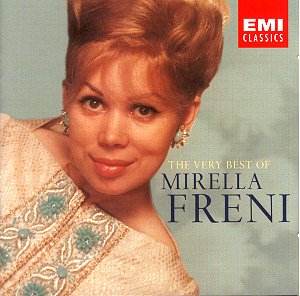Mirella Freni made her professional debut at the young
age of twenty in her native town of Modena. After a spell in the Italian
provinces, and a season with the Netherlands Opera, she appeared at
Glyndebourne in 1960 (Zerlina), Covent Garden in 1961 and La Scala in
1963, where she was Mimi in the renowned Karajan-Zeffirelli production
which was filmed and is now available on DVD. Freni moved quickly to
Violetta under Karajan and Giulini. In many ways it was a step too far
too soon in a fach that was not to be her métier. The famous
Act I scene, recorded in 1965 (CD2 tr3) exhibits good characterization
but not the coloratura the best interpreters bring to the part. Where
her lovely lyric voice was to be heard at its best at this time was
in the likes of La Boheme and the French repertoire. Her 1964
recording of Mimi under Schippers (CD1 trs 2-3) finds her light toned
and fresh voiced; innocent and very believable. Freni recorded the part
again under Karajan in 1972 where her voice had developed greater colour
and her characterization deepened. Matched by Pavarotti as Rodolfo,
it is a truly great recording, but being on the Decca label it cannot
be included here. What we do have is Freni’s Marguérite from
Gounod’s Faust (CD1 tr 12), from a 1968 recital under Votto where
her even, girlish, light tone, is to be preferred to her portrayal in
the 1978 recording of the complete opera, good though that is. Similar
strengths grace her 1968 Juliette (CD1 trs 13-14), a performance that
was the recorded benchmark for thirty years until displaced by Gheorghiu
and Alagna’s more recent recording, also on EMI. This issue could gainfully
have included her Mireille, which she recorded for the company in 1979.
Freni never ventured far in the bel canto repertoire
although she sang in ‘I Puritani’ at the Wexford Festival of
1962 and to acclaim in Rome in 1969 (with Pavarotti). An excerpt from
a 1965 recital included here (CD2 tr2) makes for an interesting comparison
with Caballé’s interpretation to be found on the disc devoted
to her singing, also in this series. In the 1970s Karajan tempted Freni
into Verdi with the offer of Desdemona (Otello) at Salzburg and
the associated recording. Knowing her own strengths, and keen to preserve
them and her career, she asked for a year to prepare - and with the
right to refuse at the end! The results are a superb ‘Willow Song’ and
Ave Maria (CD2 trs 13-14). Purity of tone, legato and outstanding characterization
of Desdemona’s uncertainty, frustration and desperation pour out of
every bar. Tempted by Karajan to try Aida, and after her great La Scala
success as Maria Boccanegra under Abbado (recorded by DG), her portrayal
is represented here (CD2 trs 11-12). In ‘O patria mia’ there is a little,
and I stress a little, sign of strain. Despite Karajan holding the orchestra
on a tight rein the part demands all the singer’s resources. Indeed,
the live recording of the ‘Forza’ Leonora, from the stage of
La Scala in 1986, is at least a size too big for Freni’s instrument
(CD2 trs 9-10) with her phrasing becoming choppy and abbreviated and
the legato line broken. The recording of these two tracks is the poorest
on the discs, with recessed sound and the voice set too far back. Those
tracks apart, the recordings have all been well re-mastered to give
a good forward sound.
Freni’s care of her voice means that in 2003 she is
still appearing, in the Russian repertoire, on the operatic stage. I
will cherish this issue which, together with the disc in Decca’s ‘Grandi
Voce’ series (still around in some shops), devoted to extracts of her
work for that company (440-412 2), provide examples of a superb singer
and artist at the height of her powers. I commend this issue to all
lovers of singing and this artist in particular.
Robert J Farr



